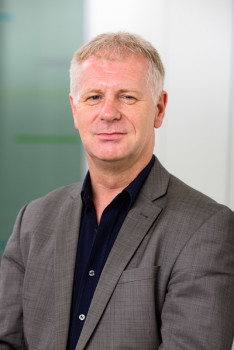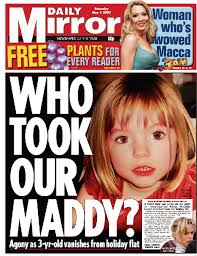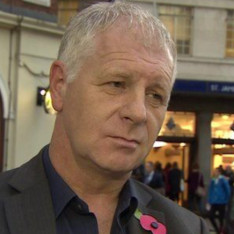Clarence Mitchell: ‘I approached Madeleine McCann disappearance as a major news story’
 Former BBC journalist Clarence Mitchell helped keep the story of the disappearance of three-year-old British child Madeleine McCann in the media for eight years. In this Q&A he discusses the challenges of the case, his career as a journalist and the road to launching his own communications consultancy, Clarence Mitchell Communications.
Former BBC journalist Clarence Mitchell helped keep the story of the disappearance of three-year-old British child Madeleine McCann in the media for eight years. In this Q&A he discusses the challenges of the case, his career as a journalist and the road to launching his own communications consultancy, Clarence Mitchell Communications.
What was the most challenging part of being the spokesman for the McCann family?
There were constant daily challenges. Hourly, in fact. And at times 24/7 – for the first couple of years. Not least having to correct, rebut or balance very rapidly the initial hostile coverage that the family faced, particularly in Portuguese media.
False stories based on anonymous briefings on one day were then simply repeated internationally the next day before being re-repeated in Portugal on the third day.
UK journalists, especially, were under immense newsdesk pressure to deliver a sensational splash irrespective of the day’s actual events or the truth of something, which meant much of my time was spent dampening down – or stopping altogether – the most lurid, exaggerated or blatantly fabricated headlines.
Hostile UK coverage of the Portuguese police also meant the situation quickly became very nationalistic and highly political, too. Cultural differences added to the mix.
Being an advocate for the family and their friends, defending their reputation and actions and constantly attempting to pull what felt like a daily soap opera back to concentrating purely on the search for Madeleine was the main overall challenge.
 How do you go about engaging with media on such a sensitive story as Madeleine McCann’s disappearance?
How do you go about engaging with media on such a sensitive story as Madeleine McCann’s disappearance?
Whilst it has been and continues to be a highly emotionally-charged situation, I could not, and cannot, afford to be emotional with the media in any way. Tact, sensitivity, understanding and diplomacy were needed from the outset. Not least given the international and cultural differences so publicly at play, quite apart from the core human story of Madeleine’s disappearance itself.
I approached it as a major news story as a news reporter would, with all the dispassionate journalistic demands for immediate information, access and briefings that go with one.
As a former journalist myself it also helped considerably that I knew what journalists, both print and broadcast, would largely want, how they would approach it and when were their individual pressure points, according to their respective deadline rhythms.
It meant I could predict with some certainty what elements of the story they would focus on, how it would play out over any given 24 hour news cycle and, if feasible and practical with law enforcement on the ground, how I could create opportunities for them, while liaising closely with the family at all times. I then prioritised which outlets would get what and when, if at all.
Part of it was also daily relationship-building on the ground and developing trust to overcome the language difficulties and improve international media co-operation. Getting local media to share pooled picture and interview opportunities, for example, was a particular hurdle until they understood they could trust me to deliver for them.
What are the key PR skills needed when handling a case such as the disappearance of Madeleine McCann?
 It needed a mixture of skills: sheer common sense, honesty, rapidity of response, having a clear line to take ready and dealing with the journalists in as straightforward and open a way as possible, given the constraints of the police operation.
It needed a mixture of skills: sheer common sense, honesty, rapidity of response, having a clear line to take ready and dealing with the journalists in as straightforward and open a way as possible, given the constraints of the police operation.
If a journalist was straight with me in their approach and demands, I was straight with them in what I could or could not tell or offer them, which on many days wasn’t much.
In terms of assisting the family themselves, it also required tact and sensitivity and an understanding of their own antipathy towards certain media requests, discussing with them in detail the merits of certain bids and how they may or may not help the wider search.
I effectively acted as the middleman trying daily to balance the family’s privacy and law enforcement’s operational restrictions on public statements or picture opportunities with the media’s constant desire and demand for updated information and their central, over-riding desire to help the search.
At certain times coverage could be highly counter-productive and it was hard for journalists to accept that.
I also took a hard-nosed attitude to any journalistic nonsense, blatant exaggeration or swallowing of downright lies. Later, I acted as liaison with the family’s defamation lawyers and senior editorial figures in the UK, which required tact and diplomacy whilst also making robustly clear the failures of their own internal editorial systems.
What are the lessons you’ve taken away from handling the McCann case that you can apply to your other clients, especially now you’ve started your own firm?
To be as human, empathetic and sensitive as possible, whilst still being firm, brutally honest and fair in dealing with both your clients and the media.
Common sense, transparency and an ability not to be afraid to say it how it is still takes you a long way in PR, not the latest comms jargon or buzzword.
The industry, at heart, is still driven by relationships and the mutual trust that develops as your advocacy grows for a client or your sell-in delivers for a journalist. Nurture those core characteristics in all your client and media relationships and they will underpin your success, bolstering everything you do.
 How does working as a journalist for the BBC differ to working in public relations?
How does working as a journalist for the BBC differ to working in public relations?
There were both similarities and key differences. At the BBC, I spent 20 years dealing with hard facts rather than opinion, researching stories extensively and establishing the accuracy of a situation – the exact same attributes needed in PR when understanding a client, their background or product and the facts of their situation. That core journalistic discipline has stood me in very good stead ever since.
The differences, though, lie in my originally not being able to express any view as a news reporter.
In PR, particularly within reputation management, I had to rapidly become an advocate, taking a position and arguing it strongly on behalf of the client, almost, in fact, a political role. That was a big adjustment to make from simply being the impartial BBC observer and messenger.
How did your experience leading the British government’s media monitoring unit prepare you for working in PR?
It gave me a crucial insight into the workings of central government structures at the highest level, along with an understanding of the civil service culture and attitudes – all vital for effective public affairs outreach in my later PR life.
It also gave me strong political insight. Although I, of course, operated with strict neutrality under the Civil Service Code of propriety, working for Ministers of the day, no matter which Party was in power.
Running a mid-sized team of Information Officers across a 24/7 rota was also good management experience for my later chairing of public affairs and media practice areas in a network agency.
In many respects, the UK civil service was the ideal bridging element in my career to make the transition from journalism to PR.
What are the challenges in starting your own PR business?
Establishing, expanding and diversifying my core client list as swiftly as possible. I have been fortunate enough so far to have built a public profile that has brought me a valued client base, stretching across the personal, corporate and political spheres.
 My central challenge now is to consolidate CMC Ltd to become a significant industry presence, whilst building out new relationships and client offers across potential new sectors, for example, in entertainment and sport.
My central challenge now is to consolidate CMC Ltd to become a significant industry presence, whilst building out new relationships and client offers across potential new sectors, for example, in entertainment and sport.
In terms of the PR industry what do you see as the key challenges for the year ahead?
The industry still needs to build a far broader C-suite acceptance of the PR and comms function as an integral part of the core management and marketing portfolio. For too many companies PR remains a bolt-on, regarded as expensive, only really visible and valued when a crisis hits.
The key industry challenge remains the need for PR to prove its worth daily within the boardroom, not simply as a generator of publicity or some sort of press office add-on, but as the ever watchful. multi-channel promoter and guardian of reputation, brand and share price.
In the sprawling digital age, clients – corporate, political and personal – still need to understand that while the day of controlling the message is largely over, replaced by the day of influencing it, the attendant multi–platform opportunities to do so have never been greater.
Logistically, staff retention, low pay for interns and an uncertain global economic climate continuing the
Clarence Mitchell is the keynote speaker at Mumbrella’s 2016 CommsCon conference, in Sydney on March 23.
For more information on the CommsCon program and how to buy tickets click on the banner below.

